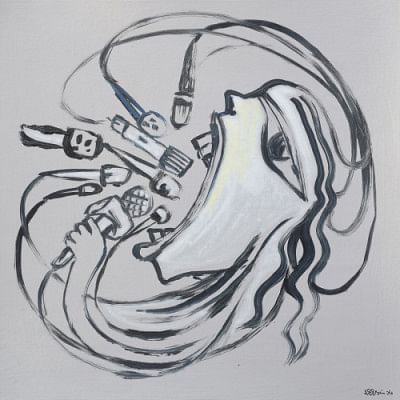The extra pair of eyes

Strangely, we are not where we used to be anymore. Students who used to steer movements against tyranny have themselves become tyrants. Carrying a weapon is not an issue. Many of them use it to scare their mentors, many to kill, and many to also grab lands, footpath and plots. This has become routine. The last one happened a few days ago when two students were spotted holding guns and protesting an eviction carried out by Dhaka South City Corporation in Gulistan. It is common knowledge that those who have muscle power are the ones who suffer from the illusion of immunisation. We often forget that even the most powerful of them all fail at one point or the other. The students, who hardly looked like students, and had the classic look of classic goons also, were most fortunately expelled from the political party. Now, were they the only ones who had guns, or were there more with weapons stuffed in their pockets that day? The general public only saw what made headlines that day. We only saw what media shared.
There are two dailies which run full stories on the city everyday. They cover everything starting from land grabbing to waste. Anyone connected to city governance, including the mayors, are hopefully clued in to the reportage and also address issues raised in those pages. Therefore, when there's a picture of accumulated waste somewhere, the waste is removed following the newspaper coverage. Anything that gets reported in those pages, attract attention and hence, those who govern the city take the photos and the reports seriously and respond positively. That is, I guess, the beauty of the media. Through media, our vision is enhanced as it gives the readers an extra pair of eyes to look, sense and feel the anomalies in order to react, digest or revolt. Similarly, when there are reports of fire, cracks or deviation on factories, we react and try and address the burning issues immediately. We do this to handle our reputational risk. We fear negative exposure, and therefore we react. If our actions are followed by fear, then do we really get to collectively remedy the whole scenario? A waste dump somewhere, a political goon with a gun in his hand may be a part of a page of news, but that news also comes with a shelf life. What about our inner eyes that have gone blind over disuse? This does not apply to only us living within this land, this applies to those who interact, trade and engage with us.
Very recently, a fear of the news of departure of the two platforms overviewing the overall remediation and relocation of the factories in readymade garments sector in 2018 has caused a lot of concern and curiosity. Some have said that we have limited resources, limited access to safety knowledge and that we may not be ready for Accord and Alliance to exit Bangladesh. Also, many within us believe that we are equipped to do what we have committed to achieve by 2018.
Realistically, there are 3,746 factories, out of which only 1,368 were inspected by Accord, 829 by Alliance and 1,549 by National Action Plan. Only 39 were found vulnerable. Rest all were accepted as remediable or were given suggestions to relocate. The ones which were announced to be unsafe and were closed down faced a Review Panel in consultation with the Inspector General of Department of Inspection for Fire and Establishment (DIFE) as Convener, along with Accord, Alliance, BGMEA and BUET as members. Beyond 2018, if the platforms exited, will we be able to grow or sustain our new pair of eyes? Shall we be equipped to self-audit and monitor ourselves? Many sincerely believe that post-2013, while coping with the national and international pressures, most of us have become extra-aware of the safety requirements and are far more engaged with the labour working in our factories. In all fairness, we have gotten better and though we remain appearing as "work in progress", our paths have been set in stone.
I recollect the appeal of Milan Kundera's The Unbearable Lightness of Being as a college student. In the novel that covers Prague Spring, there is a totalitarian power controlling the behaviour of Tereza and Tomas, both through the gaze that is directed at private life from the outside and through subsequent action. This gaze is ultimately internalised. Both protagonists begin to experience their fear of being seen and suspected. The anonymous "external power" (Foucault) permanently affects the two while the internalisation of totalitarian fictions leads to their unbearable lightness of being. Truth remains, we have to be able to see with our own eyes things that are to be remedied or resolved. Just a two-column news on the garbage that's piling up in Mirpur may help to get that pile removed but does not clean the whole city; just a front page of a few "student" leaders raising guns to protect their illegal occupation may get them expelled, but it does not correct or amend the whole system that suffers from political vulnerabilities. Similarly, just a report on rogue factories and a couple of monitoring platforms may prescribe correction, but the real change has to come from within. All of us need to grow our extra pair of eyes, and not just depend on media or monitors.

 For all latest news, follow The Daily Star's Google News channel.
For all latest news, follow The Daily Star's Google News channel. 



Comments